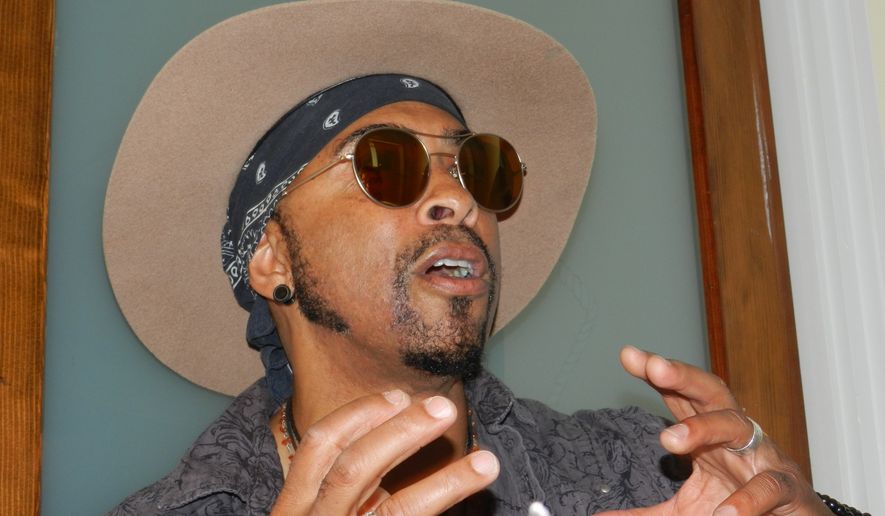If all Andre Cymone ever did was grow up with Prince and help the Minneapolis genius develop his first albums, his place in music history would be secure. But when he left the Purple One’s band in 1981, Mr. Cymone blazed a funky path of his own, first with three funk/rock albums that were way ahead of their time, then as a producer and songwriter.
Mr. Cymone created tracks for everyone from Pebbles to Tiffany and even Adam Ant, and is responsible for Jody Watley’s biggest hits, including “Real Love” and “Looking for a New Love.”
His latest album, “1969,” is a straight-up rock ’n’ roll protest record worthy of comparisons to both Bob Dylan and Woody Guthrie. He discussed what stoked that album and early and final memories of Prince.
Question: How was your recent tour with New Power Generation?
Answer: It worked. It’s weird for me because my only connection to them is Prince. To be there without Prince is awkward. They tell all these stories from their perspective about their experience with Prince, and I’m going, “That’s not my experience.” (Laughs)
They dealt with a different guy [who was] reinvented, reborn.
Q: You have been called everything from Prince’s mentor to his first collaborator to his adopted older brother. How would you define your relationship in the early days?
A: He’s older by two weeks! (Laughs) He did come to live with me and my family. We were together 24/7.
He didn’t have anything. No clothes, didn’t have a guitar. It was very bare-bones. We had a genuine love for each other as friends.
Q: Did you help his development?
A: We used to push each other musically and creatively, artistically and lyrically. In a lot of ways he helped me develop.
I was a wild kid. I would tell everybody, “I’m gonna be a rock star.” He was the first person who I told that who didn’t say, “You’re crazy.” He said, “Yeah, me too.” From then on, I had somebody that I could sort of storm the castle with.
Q: Why did you leave Prince and go solo after “Dirty Mind”?
A: I decided to go solo because coming up, while I was bragging, I never said, “I’m gonna be in someone else’s band.” I was happy for Prince.
Q: Were you happy with the three solo albums you made in the ’80s?
A: I was beyond happy with the albums. My mindset at the time was, “The record company is going to give me $250,000 ?” Me? This little nappy-headed kid from the projects who ain’t never seen that kind of money, and I get to do whatever I want?
I wanted to make the kind of music nobody has ever done — not thinking about what was commercial at the time or what the record company expected.
Q: Did the record companies pressure you to make “Prince-like” albums?
A: I fought that, but it was like punching King Kong in the kneecaps. I said, “I know what you guys want, but I wanna do this stuff.”
I wanted to make sort of a black Devo thing. I said, “Why don’t you get behind what I’m doing and promote it?” but they couldn’t get behind the concept. For me music is art. I know it should be business, but I just didn’t get into music to do that.
Q: Why is the new album called “1969”?
A: In 1969 I just woke up to all the different music. I was the youngest of six, and there was all kinds of crazy music around [like] The Byrds, The Animals. So many really cool bands and cool music.
I had all kinds of albums to listen to [by] Santana [and] Grand Funk Railroad. The list goes on and on. I would just sit there and listen, and then play that stuff on my dad’s upright bass.
1969 was also a very tumultuous year with civil rights [and] what was going on with the Kennedys and [after] Martin Luther King [was killed in 1968]. It was just an amazing year for everything — art, music and politics.
Back then there were so many voices speaking out. If you flip it around to now, there are a lot of very corporate voices that say, “I can’t speak too loud because I’m signed to this corporate label.”
Q: Politically, it feels like 1969, but musically, not so much.
A: We’ve digressed musically to painting ourselves into a corner. Those around back then understand how diverse music was and how music pushed the narrative. We don’t have that now. You had Bob Dylan speaking up for black folks. Everyone was speaking about change [and] how they wanted to see the world. Integrity was the key.
Now it’s not. In the ’60s, you knew change was coming. Now things are going backwards. There’s not gonna be some spaceship that comes down and takes away the bad people. We have to do that as a culture.
Q: When was the last time you saw Prince?
A: In recent years, he would call me out of the sky blue. We hadn’t spoken for years before that, then all of a sudden I would get these calls at all hours from blocked numbers.
“Hello?”
He’d say, “Andre? Prince. What are you doing tonight?”
I’d say, “Gardening.” (Laughs)
The second-to-last time I saw him, he invited me out to a gig and asked me if I wanted to play “Dance Electric.” I told him, “I’d love to, but I haven’t played that song in years and don’t remember the words.” He said, “Don’t worry, I got a teleprompter.” Damn, he sure did.
I asked him, “Isn’t that a bit karaoke?” He laughed and said, “Not if you put your heart in it.”




Please read our comment policy before commenting.